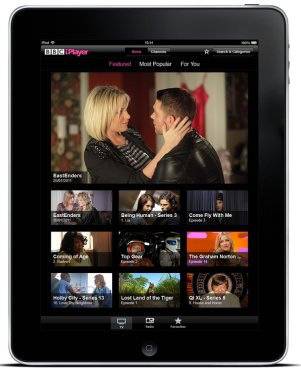The BBC has clarified its plans for the release of its Android and iPad-compatible versions of its popular iPlayer application – the British TV and radio service that delivers streaming content to the desktop and mobile devices – in light of a flurry of recent speculation. According to a post on the BBC.co.uk’s Internet blog, the media company plans to have its new Android and iPad applications in their respective app stores by the end of this week.

There were a few caveats to the use of these new apps, however. And oddly enough, there was no mention of an iPhone application.
Major Improvements for iPad Users

According to the blog post, which set out to “make official” the BBC’s plans in this area, the new native app for iPad is a major improvement over the original iPad experience – essentially just a website designed for the iPad. The new app takes better advantage of the touchscreen user interface, says the BBC, which is a popular feature on the “iPad-ified” website.
Both the iPad app and Android app will offer live TV streams and radio, the latter which was never before available to mobile devices.
Mobile users can also access the full BBC catalog of “catch-up” programs (TV you may have missed), seven days’ worth of TV and radio on demand and the “series stacking” feature that’s also available on the Web, this last item being a feature that allows viewers to watch older programs from selected series up until the series has ended.
On Android: Froyo-Only, Flash Required
On Android, the iPlayer app will not be available for all devices, only on those running the Android 2.2 (“Froyo”) version of the mobile operating system and Adobe Flash 10.1. This is because the player’s Flash streams require “a powerful mobile phone processor and a Wi-Fi connection,” says the BBC.
But as some may remember, an unofficial iPlayer app called myPlayer had arrived in the Android Market (before being booted out), but it did not require Flash. The speculation is that BBC had to implement the streaming service in Flash because of content provider pressure, not technical requirements. Content providers are concerned about pirating – that same fear is why the Netflix application for Android has not yet launched either. As stated by Netflix on its blog back in November:
“The hurdle has been the lack of a generic and complete platform security and content protection mechanism available for Android. The same security issues that have led to piracy concerns on the Android platform have made it difficult for us to secure a common Digital Rights Management (DRM) system on these devices.”
But rumor has it, Netflix isn’t going with a Flash requirement, but has been working with chipset maker Qualcomm on implementing specific technology like SecureMSM to get the Netflix app approved.
Where’s the iPhone App? And What About the Global Audience?
What’s odd about this iPlayer news is that the mobile applications will arrive for Android and iPad, but not the iPhone. For iPhone users, there is still the Apple-friendly HTML5 website. Of course, a native app would have its advantages. So, what’s the status of the iPhone application, everyone wants to know? Here, the BBC clarifies nothing.
For those outside the U.K. pining for access to British TV, there is some good news. Although not addressed via this blog post, BBC.com’s managing director Luke Bradley-Jones told the audience at the Digital TV Summit that the company will launch a “global” iPlayer this year whose content would be available via subscription.
Hopefully, the BBC will consider a native iPhone application for that time, too.

















